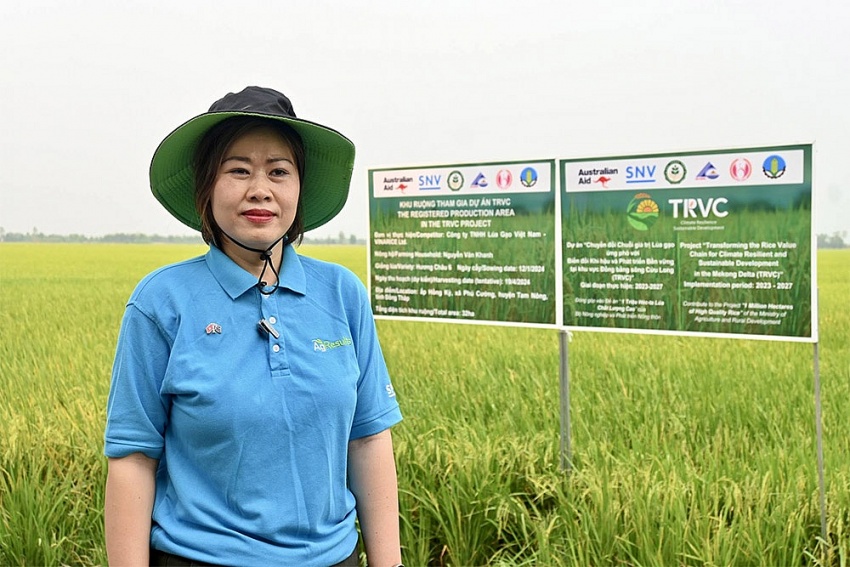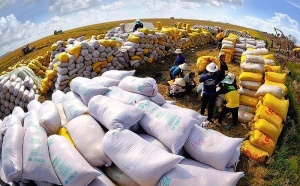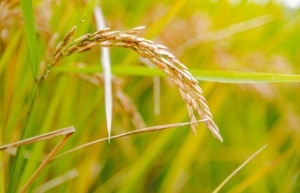A rice value chain that can address climate change
What is the SNV’s role in supporting the Vietnamese government to expand high-quality rice to cover one million hectares with low carbon emissions by 2030?
The SNV is committed to collaborating with the Ministry of Agriculture and Rural Development in this initiative. To achieve this, in addition to inviting potential large-scale producing enterprises with export orders to participate, we must also prepare a comprehensive measurement, reporting, and carbon emission calculation system that is internationally recognised, enabling us to create carbon credits that can be traded not only at the project or national level but also internationally in the voluntary carbon market.
 |
| Tran Thu Ha, director of a project to transform the rice value chain to be more climate resilient |
The SNV has designed the scheme meticulously, employing international bidding to select companies with recognised measurement, reporting, and verification systems capable of quantifying emissions on a large scale. This roadmap has been implemented by the SNV since 2022 and will continue until 2027.
Since 2010, the SNV has collaborated with Can Tho University to carry out research projects on carbon measurement in rice. We have successfully leveraged the role of private enterprises to promote the application of these technologies in the Red River Delta.
The SNV has also designed the TRVC project - on transforming the rice value chain in the Mekong Delta - to replicate all validated results from 2010 to the present. This is an opportunity to expand rice production, enhance the role of the private sector, and calculate, measure, and acquire credits for low-emission rice production.
TRVC is a groundbreaking idea, pioneering yet well-prepared since 2010 through three interconnected projects. The first focused on researching low-carbon rice production scale in the Mekong Delta to reduce greenhouse gas emissions.
Subsequently, the Australian government, alongside the US and Canadian governments and the Gates Foundation, funded a sustainable rice production and emission reduction initiative from 2017 to 2021.
The TRVC project that followed directly contributes to the goal of 1 million hectares of high-quality rice by harnessing the role of enterprises in the rice value chain of the Mekong Delta, aiming to facilitate the transition to low-carbon production. This will lead to certification for low-carbon branding and establish a mechanism for voluntary carbon credits in the carbon market starting from 2027.
What has the SNV done to support enterprises participating in the project and connect them with farmers?
The TRVC plan is being implemented in three key rice-growing provinces of the Mekong Delta: An Giang, Kien Giang, and Dong Thap, during the 2023-2027 period.
We have supported An Giang with approximately VND22 billion ($885,000) to develop the rice value chain locally, assisting provinces in transitioning to climate-resilient and low-carbon rice farming methods through the development of sustainable value chains, improving livelihoods for rice-farming households.
It also supports 11 enterprises linked with around 200,000 smallholder farmers and 50-60 cooperatives in An Giang, Dong Thap, and Kien Giang, with the expectation of aiding the transition of over 200,000 ha to low-emission rice production by 2027.
Before participating in the TRVC project, enterprises had some level of connection with farmers, but often focused solely on rice prices and quality at the end of the season. Since joining, these enterprises have started collaborating with farmers from the beginning of the season, guiding them to adhere to cultivation procedures, reduce seed use, cut down on chemical fertilisers, and decrease water consumption. We anticipate that this cooperation will yield tangible and measurable results by the end of the season.
What benefits will farmers in the project area gain from practising sustainable rice farming and reducing carbon emissions?
Farmers will experience practical benefits when participating in rice production in areas linked to enterprises involved. They will learn how to use inputs more efficiently, which will contribute to a 15 per cent reduction in input production costs, a 20-30 per cent reduction in chemical fertilisers and pesticides, and a 20-40 per cent reduction in water consumption.
Given the rising costs of fertilisers while rice prices do not increase correspondingly, reducing costs and optimising productivity will be effective strategies for achieving higher economic returns.
Participating enterprises will also ensure that farmers receive at least 30 per cent of the profits from rice production through purchase contracts. With premium rice segments and the sale of carbon credits, enterprises are committed to sharing profits with farmers.
How will the TRVC incorporate technology to monitor the implementation of each farming household?
It has employed a system of internationally recognised standards, specifically the size-specific standards, to measure and calculate farming conditions at each rice field of every farmer. The technology implemented in this system uses satellite imagery and AI algorithms to simulate and calculate emissions based on corresponding weather and climate conditions.
This system is internationally recognised and is being implemented globally, and Vietnam is a pioneering country in adopting this technology. Farmers are encouraged to keep field diaries to ensure transparency when carbon verification and validation agencies conduct assessments.
 | Vietnam to benefit as Indonesia increases rice import volumes Vietnam is set to capitalise on Indonesia's record-high rice import volumes, as the rising demand from the neighbouring country opens up significant export opportunities for local producers. |
 | Rice cultivation makes use of advanced tech Many agricultural businesses are intensifying the large-scale application of advanced rice production technologies to boost economic value, while also reducing emissions. |
What the stars mean:
★ Poor ★ ★ Promising ★★★ Good ★★★★ Very good ★★★★★ Exceptional
 Tag:
Tag:
Related Contents
Latest News
More News
- Masan Consumer names new deputy CEO to drive foods and beverages growth (February 23, 2026 | 20:52)
- Myriad risks ahead, but ones Vietnam can confront (February 20, 2026 | 15:02)
- Vietnam making the leap into AI and semiconductors (February 20, 2026 | 09:37)
- Funding must be activated for semiconductor success (February 20, 2026 | 09:20)
- Resilience as new benchmark for smarter infrastructure (February 19, 2026 | 20:35)
- A golden time to shine within ASEAN (February 19, 2026 | 20:22)
- Vietnam’s pivotal year for advancing sustainability (February 19, 2026 | 08:44)
- Strengthening the core role of industry and trade (February 19, 2026 | 08:35)
- Future orientations for healthcare improvements (February 19, 2026 | 08:29)
- Infrastructure orientations suitable for a new chapter (February 19, 2026 | 08:15)





















 Mobile Version
Mobile Version